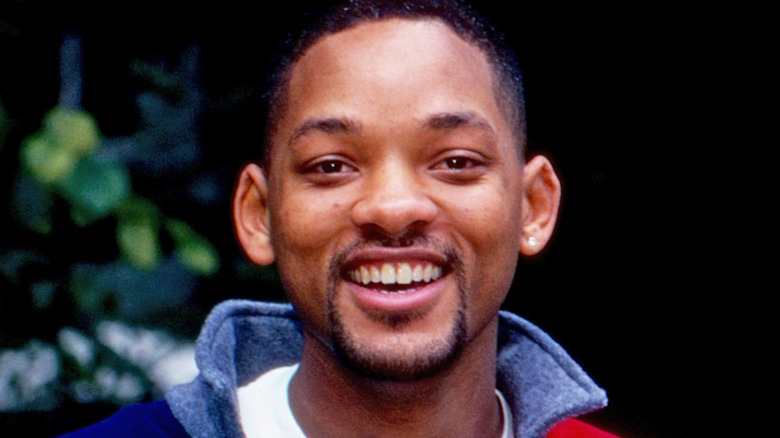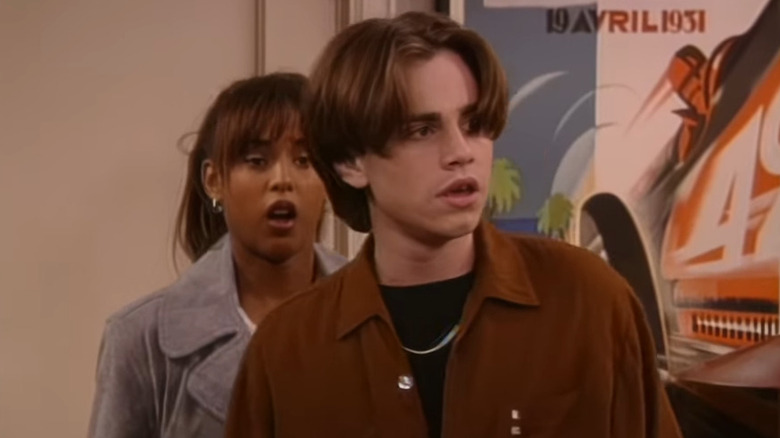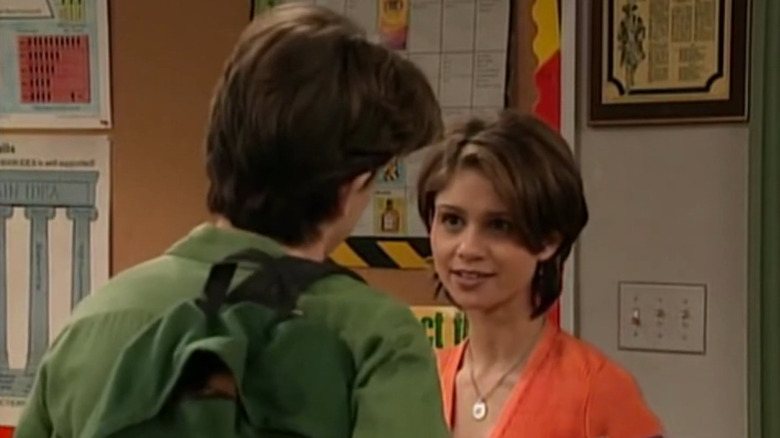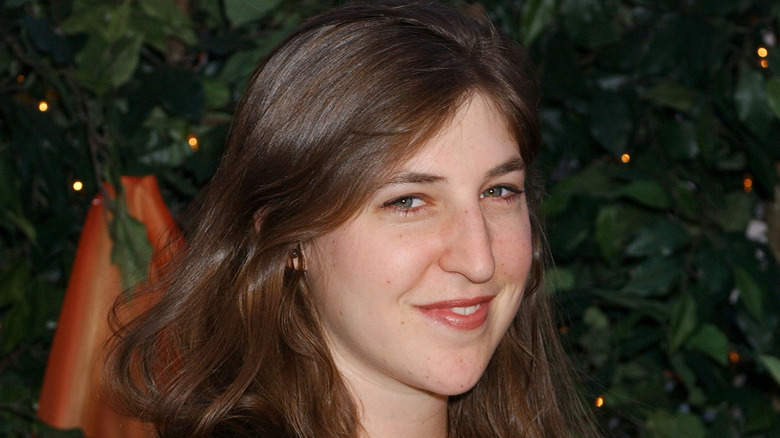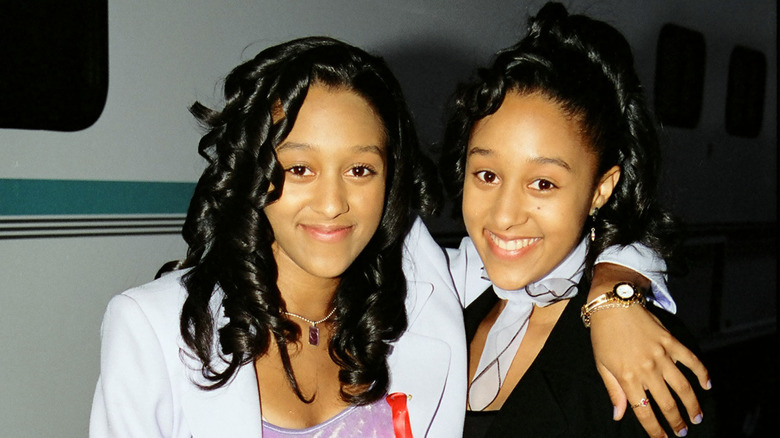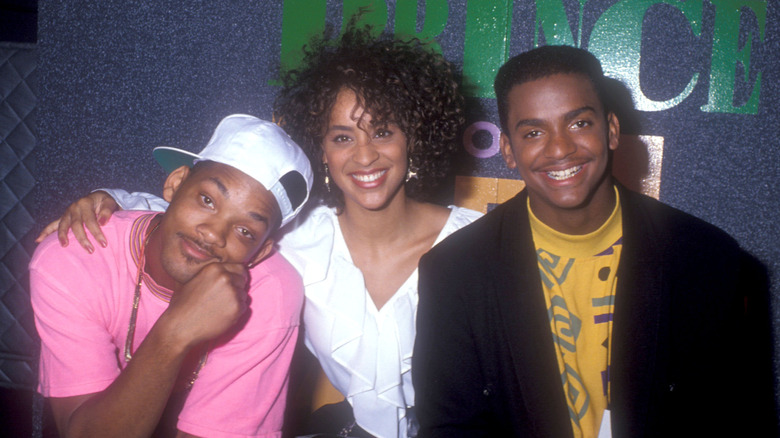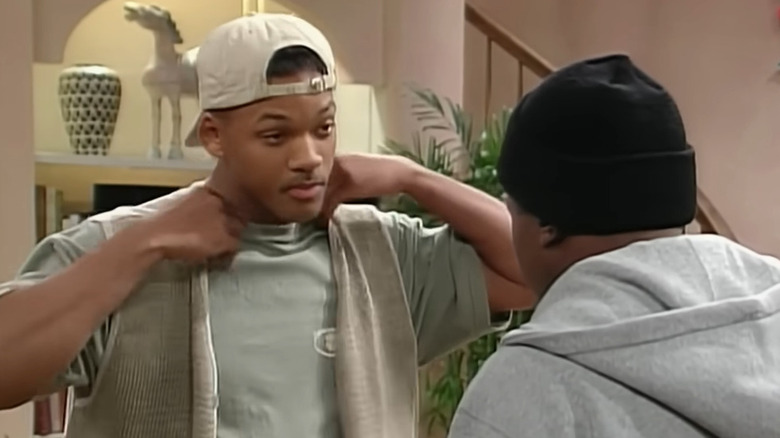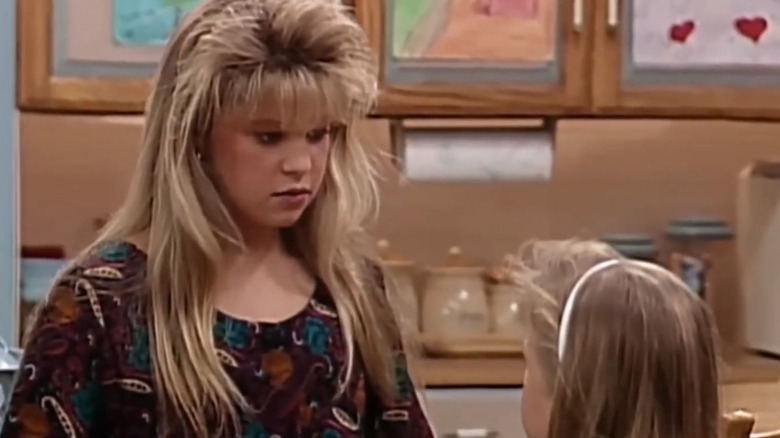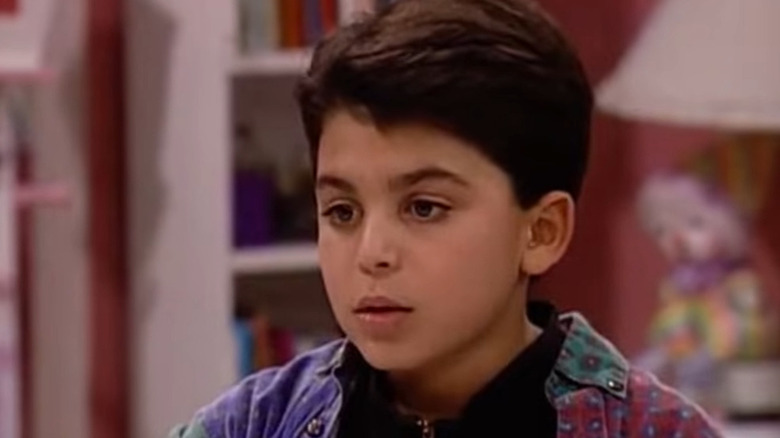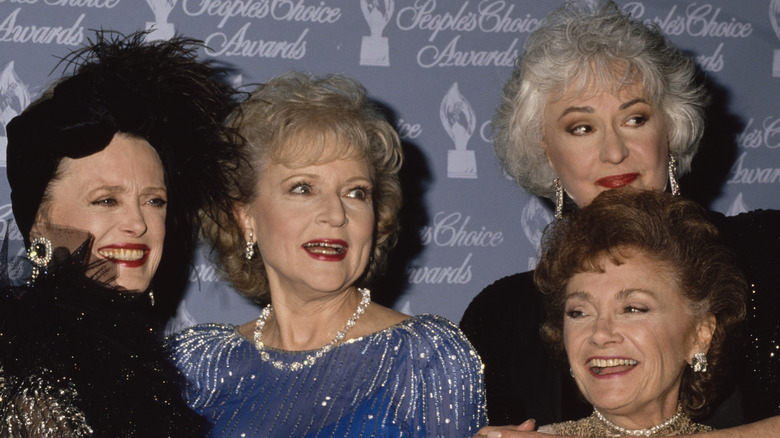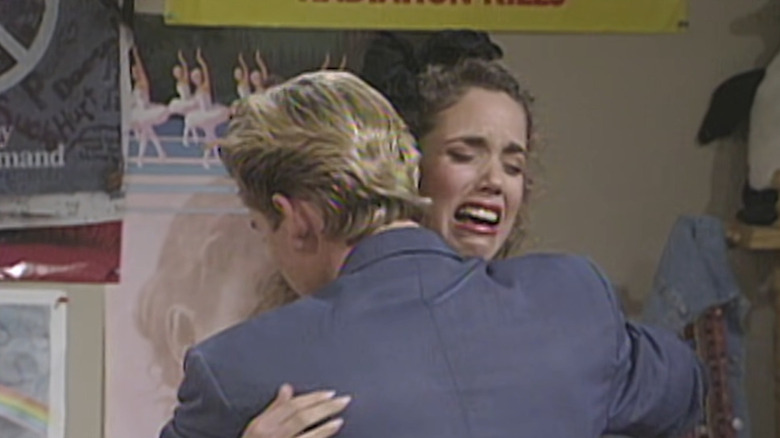The Darkest Sitcom Moments Of The '90s
This article contains references to eating disorders, child abuse, domestic abuse, sexual abuse, and substance abuse.
Following the decade of excess that was the 1980s, the 1990s were a period defined by the end of the Cold War, shifting attitudes about race, gender, sexual orientation, the environment, and much more, as well as the proliferation of new technology and the internet. Meanwhile, more minimalist fashion trends pushed out neon colors and shoulder pads, Monica Lewinsky's tragic truth played out on a worldwide stage, grunge music and third-wave ska came and went, and blockbuster films "Jurassic Park," "Titanic," and "Men in Black" dominated at the box office.
That said, while the change was felt in the television space, too, with sitcoms like "Friends," "Home Improvement," and "Seinfeld" taking the baton from old favorites, many of the tropes and programming strategies of the '70s and '80s remained in place. That includes "very special episodes," where sitcoms departed from their typical comedy-by-numbers approach and got dark in an effort to tackle difficult subjects and greater societal issues. Moreover, much like the TV hits of decades past, the approach these series took with certain topics and execution thereof — particularly when viewed through a modern lens — brings an added level of darkness to some stories and situations. As such, there's no shortage of dark and disturbing moments in '90s sitcoms.
Here are some of the darkest moments to come out of the otherwise largely inoffensive series of the 1990s.
Boy Meets World explored alcoholism and partner abuse in an episode (with mixed results)
For seven seasons, from 1993 to 2000, "Boy Meets World" served as one of the anchor series for ABC's popular "TGIF" programming slate. Starring Ben Savage, the show followed the exploits of teenager Cory Matthews and those of his friends and family, as he grows up in Philadelphia. As the series went on, the will-they-or-won't-they romance between Cory and Topanga (Danielle Fishel) became central to the show's story. However, one episode saw their awkward dynamic serve as the catalyst for a horrible moment for their friend, Shawn (Rider Strong).
In the Season 5 episode "If You Can't Be With the One You Love..." Cory drinks at a party because things are weird between him and Topanga following a breakup. He then convinces Shawn to drink with him, and the two get busted for underage drinking. From there, Shawn, whose father was an abusive alcoholic, continues drinking and making bad choices, including shoving his girlfriend Angela (Trina McGee-Davis) into a door when she tries to stop his drinking.
Strong recently confessed on "Pod Meets World" that he was miserable shooting the episode, and he still doesn't like it. "To try and cram an entire alcoholic journey and sobriety journey into 22 minutes, that's not ever what it actually is like. That's never how it happens in real life. So in a weird way, it's hurting the issue that it's trying to address," he said (via the New York Post).
Shawn also joined a cult on the show
Sticking with "Boy Meets World," which featured a cast with some dark secrets, the Season 4 episode "Cult Fiction" touched on a topic that was not often explored by sitcoms by the time the 1990s rolled around; namely, religious cults/fanaticism. And, once again, it was Rider Strong's Shawn who was at the heart of the matter. In the episode, Shawn's teacher, Mr. Turner (Anthony Tyler Quinn), admonishes the boy to keep his future in mind and to understand that not all of his friends are going to be around after graduation. A classmate named Sherri (Tamara Mello) uses this speech and Shawn's own uncertainty to lure him into a cult known as The Centre.
Led by Mr. Mack (Jerry Levine), the Centre looks to be a safe haven for wayward teens on the surface, but Shawn becomes apprehensive about it due to the way in which the teens are interacting with each other, with him, and Mack (who's just as touchy-feely with the kids as they are with each other). Nevertheless, he ultimately finds himself brainwashed and fully in the group's grips, initially refusing to break off from it even when Cory (Ben Savage), Eric (Will Friedle), their parents, and the boys' longtime teacher, Mr. Feeny (William Daniels), express concern.
In the end, it takes Mr. Turner getting into a bad motorcycle accident for him to realize who his real friends are.
Blossom found a gun in a classmate's locker, and then the classmate tragically died
"Blossom" aired for five seasons on NBC, from 1990 to 1995, and starred Mayim Bialik as the titular character — an Italian American girl coping with life as a teenager in a male-dominated, single-parent household in the general vicinity of Los Angeles. It was the show that made Bialik and Joey Lawrence teen stars and was popular among that particular demographic. Not everything that occurred on the show was teen hijinks, however, with one episode turning deadly.
In the Season 4 episode "38 Special," Blossom sees a student named Jimmy (Devon Gummersall) for the first time in a while and notices he has a gun in his locker. When she asks him about it, he assures her that it's not real, that he just brought it to scare somebody, and that she shouldn't tell anyone. Ultimately, Blossom thinks the better of it and reports Jimmy via an anonymous tip line, after which he gets angry with her for doing so. Worse yet, the gun isn't found when his locker is searched.
In the end, it's revealed that Jimmy has died after having an accident with the gun. Meanwhile, the episode's B-story sees Blossom's brother Joey (Joey Lawrence) meet a depressed, alcoholic clown who had performed at his sixth birthday party, eventually engaging in a tense conversation about life and death with the performer after he mistakenly thought he had jumped off a cliff.
A creepy photographer insinuated having a threesome with the Mowry twins in an episode of Sister, Sister
Although it crashed and burned as a part of ABC's "TGIF" lineup initially, "Sister, Sister," which ran for six seasons from 1994 to 1999, became a teen hit on the upstart WB network. Starring Tia and Tamera Mowry, the series chronicled the lives of twin sisters who are separated at birth after being adopted by different parents, only to reconnect years later thanks to a chance encounter (and they end up living together). While the reunited sisters get into their share of trouble in the series, some of those escapades were more sinister than others.
In the Season 4 episode "Model Tia," the sisters meet a supposed famous photographer named Varique Dalton (Keith Amos), with whom Tia was chatting online in hopes of becoming a big-time model. Their parents refuse to let them do a free photo session offered by Varique, but Tamera decides to go anyway, posing as her sister. Later, it's revealed that the man isn't who he says he is and is simply trying to lure young girls. During the photo session, he tries to convince Tamera to change into skimpy clothing. When Tia shows up to get her sister, he tries to keep the girls there, and even exclaims, "So, what do you say we get this party started?" while leering at them.
The girls are rescued by their parents in the end, learning a hard lesson along the way.
Police racially profiled Will and Carlton in an episode of The Fresh Prince of Bel-Air
While Will Smith had achieved a high level of notoriety as a rapper alongside DJ Jazzy Jeff with hits like 1988's "Parents Just Don't Understand," it was his sitcom vehicle, "The Fresh Prince of Bel-Air," that would eventually propel him into the realm of Hollywood's A-listers. Airing on NBC for six seasons from 1990 to 1996, the show followed Will, who was sent to live with his wealthy aunt and uncle in Bel-Air after running afoul of a gang in his native Philadelphia.
"The Fresh Prince" veered into "very special episode" territory more than most sitcoms of its day, wholly unafraid to confront the issues of the day with its young audience from jump street. In the first-season episode "Mistaken Identity," Will and his cousin, Carlton (Alfonso Ribeiro), are pulled over by police for driving an allegedly stolen Mercedes (that they were actually given permission to drive). Regardless, it doesn't go well, and the boys end up in jail until Uncle Phil (James Avery) is able to get them out.
Carlton is initially reluctant to believe that a justice system that he believes in would allow for this kind of racial profiling. However, Phil — himself a highly respected lawyer — lets his son know that such things are more common than he thinks, and they had even happened to him when he was younger. The episode aired mere months before the Rodney King incident occurred in LA.
Will also dealt with the tragic reality of his absentee father
At different points in "The Fresh Prince of Bel-Air," the relationship between Will (Will Smith, who many still wonder about) and his estranged father, Lou (Ben Vereen), is referenced. However, the relationship took center stage during the Season 4 episode, "Papa's Got a Brand New Excuse." During the episode, Will and Carlton (Alfonso Ribeiro) are together at the cafe where they work when Lou shows up out of the blue after not having been in his life for the previous 14 years. Despite Uncle Phil's (James Avery) misgivings amid Lou essentially having been an absentee father, Will and his dad begin to spend time and bond together, eventually planning to take a cross-country road trip together to make up for lost time.
In the end, though, Lou — who works as a trucker — decides instead to make a shipment on the other side of the country. Phil practically begs Lou to keep his promise and be there for his son, even offering to buy Will a plane ticket so he can meet his father in Maine, but Lou declines, later telling Will that they'll have to take their trip another time. Although Will acts strong in front of his father, and even in front of his uncle, initially, it's only a matter of time before he completely breaks down, giving one of the most heartbreaking TV speeches of its time and asking Phil through tears, "How come he don't want me, man?"
DJ became anorexic to look good for a pool party in Full House, and the episode remains controversial today
For eight seasons from 1987 to 1995, "Full House" was a hit on ABC with viewers of all ages, showing the lives, laughs, and love of a middle-class San Francisco family, the Tanners, in the years following the death of a wife/mother. The show introduced the world to Candace Cameron, Jodie Sweetin, and the Olsen twins, while raising the profile of its Bob Saget-led adult cast. But while the misadventures of a single dad, his three daughters, and their uncles served as comfort viewing for multiple generations, there were times when things actually got pretty uncomfortable.
Such was the case during the Season 4 episode, "Shape Up," when the oldest Tanner daughter, DJ (Cameron; now the Hallmark alum Candace Cameron Bure), becomes nervous about her appearance as she's set to attend a pool party to celebrate the birthday of her best friend Kimmy (Andrea Barber). As a result, she begins starving herself and nearly passes out at the gym. Sadly, Bure's life and art came to imitate one another in this instance.
"I developed an eating disorder when I was 18," Bure said on a 2025 episode of her eponymous podcast. "It was binging and purging, like, I'm a bulimic. I still say I'm a bulimic because the thoughts, whether I'm doing that or not, never leave me. I still need the tools to say, 'No, Candace, we're not doing that.'"
Meanwhile, Stephanie finds out her friend is being abused and doesn't know what to do
In the DJ-centric episode of "Full House," "Shape Up," where the oldest Tanner daughter (Candace Cameron Bure) develops an eating disorder, the middle child, Stephanie (Jodie Sweetin, who dealt with real-life tragedy), is sworn to secrecy by her older sibling. In the end, though, she's forced to tell her family when DJ's health is at risk. Stephanie finds herself in a similar conundrum in the Season 6 episode, "Silence Is Not Golden," during which she discovers that one of her classmates is being abused. In the episode, Stephanie is assigned to partner up with a student she doesn't get along with, named Charles (J.D. Daniels). Charles comes over to the Tanner house to work on their project and ultimately ends up revealing that his dad beats him. However, he makes Stephanie promise not to tell anyone before rushing away because he's going to be late returning home.
Despite her promise, Stephanie does the right thing when, the next day, Charles is absent from school after "falling down the stairs." Her Uncle Jesse (John Stamos) later calls the police, and Charles is placed in foster care. It was an incredibly dark moment for what could be considered a kids' show, but one that nonetheless taught a valuable lesson.
Dinosaurs explored climate change and the creatures' ultimate fate in the series finale
Airing for four seasons as part of ABC's "TGIF" bloc, "Dinosaurs" had about as wild a promise as was possible for a primetime sitcom at the time, as it chronicled the exploits of a family of anthropomorphic dinosaurs living and working in prehistoric times in much the same way that humans do now. It was one of the priciest sitcoms to produce while it aired due to the animatronics that were used to bring its aptly named Sinclair family to life. Crazy though that synopsis may sound, the incredibly dark story that served as the show's endpoint is even crazier.
In the series finale, "Changing Nature," the family patriarch, Earl Sinclair (voiced by Stuart Pankin), inadvertently triggers the Ice Age that will inevitably kill off all dinosaurs and destroy their fictional civilization in the show, and he did it all in service of his greedy bosses at the environment-ravaging WESAYSO Development Corporation. The episode served as a dark allegory for what's happening with our current environment.
"It's a powerful message. We did easily a dozen episodes about the environment in one form or another, and they were all kind of toothless because by the end of 22 minutes, we kind of fixed it. And here is one where the consequences are not fixable," series co-creator Tim Doyle told Variety in 2022. "We've f***ed up the environment and we're going to have to deal with the fallout of that."
Rose is exposed to HIV in a later episode of The Golden Girls
"Golden Girls," which wrapped up its seven-season run on NBC in 1992, went above and beyond in its treatment of topical issues, covering everything from immigration, homelessness, and LGBTQ+ issues to body image/cosmetic surgery, dementia, and more. The series, which followed four women sharing a Miami home during the twilight of their lives, even went so far as to tackle HIV/AIDS at the height of the AIDS crisis in North America. During the Season 5 episode "72 Hours," Rose (Betty White, who didn't always get along with co-star Bea Arthur) is horrified to receive a notice from the hospital that she may have been exposed to blood contaminated with HIV after receiving a transfusion amid gallbladder surgery several years earlier. The episode's title refers to the time she's later forced to wait to receive her HIV test results.
In the end, she tests negative. However, from the time she receives the letter until she gets that result, she endures an emotional rollercoaster during which the show explores issues including the discrimination those with HIV/AIDS faced at the time, misunderstanding (and misinformation) about the virus/disease, and the fleeting nature of life.
"Not only were people understandably afraid of AIDS, but a lot of people wouldn't even admit it existed," White was quoted as saying in the book, "Golden Girls Forever" (via Time). "So this was a daring episode to do, and the writers went straight for it."
Jessie became addicted to pills while preparing for an exam and a music video appearance in Saved by the Bell
Completing the list is perhaps the most infamous episode of NBC's teen sitcom, "Saved By the Bell," which aired for four seasons from 1989 to 1993 and presented the lives of several teens attending the fictional Bayside High School in Los Angeles. The Season 2 episode "Jessie's Song" saw Jessie Spano (Elizabeth Berkley) turn to caffeine pills in an effort to keep up with her schoolwork and the additional load created by her involvement in a burgeoning all-girl singing group — dubbed Hot Sundae — alongside her buddies Kelly Kapowski (Tiffani-Amber Thiessen) and Lisa Turtle (Lark Voorhies).
While some express concern for Jessie as she becomes more and more reliant on the pills, her friend Zack Morris (Mark-Paul Gosselaar) initially insists there's no problem as he hopes to keep the band going and capitalize on the girls' fame as their manager. At one point, Zack also secretly films the girls in the locker room and sends it to a record producer without their consent to pique his interest. In the end, Jessie has a full-on breakdown and collapses into Zack's arms.
If you or anyone you know needs help with an eating disorder, child abuse, domestic abuse, sexual abuse, or substance abuse, contact the relevant resources below:
-
The National Eating Disorders Association website or contact NEDA's Live Helpline at 1-800-931-2237. You can also receive 24/7 Crisis Support via text (send NEDA to 741-741).
-
The Childhelp National Child Abuse Hotline at 1-800-4-A-Child (1-800-422-4453) or contact their live chat services.
-
The National Domestic Violence Hotline at 1−800−799−7233. You can also find more information, resources, and support at their website.
-
The Rape, Abuse & Incest National Network website or contact RAINN's National Helpline at 1-800-656-HOPE (4673).
-
The Substance Abuse and Mental Health Services Administration website or contact SAMHSA's National Helpline at 1-800-662-HELP (4357).

